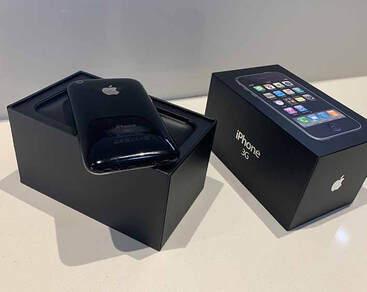
Dear Tim’s iPhone,
Strange times indeed to find myself writing to you, my mobile mate, my phablet friend. I can’t say why, but for a while I have been wanting to write you a letter.
Your memory is better than mine, but I can recall when a phone was a telephone. It was a logical device with cables to help voices reach their intended destination. It had a listening piece and a talking piece to avoid mistakes while guessing where you should place your ear or your mouth. It needed three pennies to make it work when its buttons A and B were pressed as directed. It was located inside a box of red painted timber frames holding panes of shining glass. Also inside this box was a worn directory full of names and numbers, and a musty smell unique to those wonderful places where telephone conversations were private, yet public performances.
Then in January 2007 Steve Jobs unveiled what was to be my first iPhone. This man of genius transformed nuisances into objects of desire. They joined the ranks of Rolex wristwatches, Prada handbags, and Mont Blanc fountain pens. Completely modern, timeless, of their time and ahead of their time, and at an affordable price. Beautiful to the eye and a pleasure to hold. With its rounded back resting in the cup of your hand, a touch of the screen brought to life a pattern of coloured lights which intuitively did what you wished, and the App Store opened a Pandora’s box that transformed the mobile phone into a very best friend.
Tim’s iPhone, you are a mystery, I have no idea how you work. Some people believe that Android is a better mystery, and I have friends like Shakers, who will never give up their Nokia. With time and tough competition you have become another commodity being endlessly upgraded. Your battery lasts for days and your bigger, easy to read screen improves the chances of touching the symbol that I meant to. You are not as beautiful as my first iPhone, I don’t imagine that Steve would approve of you if he was still alive to have a say, but I remain loyal to you regardless.
You always recognise my face. You politely ask my callers to leave a message with the promise that I will reply. You are privy to my dwindling number of telephone conversations,
and are the courier of a burgeoning number of text and email messages. You recall things I forget, and discover things I would like to know. You are my portal to the world, allowing me to choose what comes in and what stays out. With Google Translator I can communicate in any language, and with FaceTime I can meet with people anywhere in the world, all in the comfort of home.
Nevertheless, I have a couple of bones to pick with you. You did not invent the digital camera, but you did sneak one into your tool kit, and photography hasn’t been the same since. One of my pleasures was the art of making black and white photographs, but this stopped when I was overrun by mobile phone owners busy hunting self- portraits. And sadly you have become host to clubs whose millions of members turn their opinions into news, and news into entertainment. I am not sure that this what Steve Jobs had in mind back in 2007, or how Mark Zuckerberg first imagined Facebook.
But let’s return to brighter things. With your newest camera I can take any number of photographs, edit them immediately, print them at home or remotely, or send them to anyone I wish. With you I can shop from home, having my purchases delivered, do my banking, check the weather forecast, get the latest news (and opinions), keep in touch with friends and family, search for the forgotten meaning or spelling of words, check facts, do calculations, listen to music, read maps and get directions, and a host of other essential and entertaining daily things.
As a boy at home we had a globe of the earth, about the size of a cantaloupe which sat tilted on a wooden base. Turning it slowly I watched the oceans’ blue shapes outlining all the countries of the world, while reading their names and seeing the lines of their borders and the dots of their cities. Travelling with you on Google Earth, now the earth is blue as we approach it from space, and as we draw closer the folds of the landscape become clear, and more secrets are revealed until we can find someone’s garden, in any foreign land we choose.
Meanwhile, you and I are home inside, thinking about Steve Jobs, wondering if he had any inkling of how he would help to make this pandemic’s hiatus of disruption slightly more tolerable, while life outside as we remember it is running its handicapped race upside down.
Your grateful friend,
Tim
Tim Shannon and his family have a holiday house at Ventnor but have not been able to visit since March, when the lockdowns started.